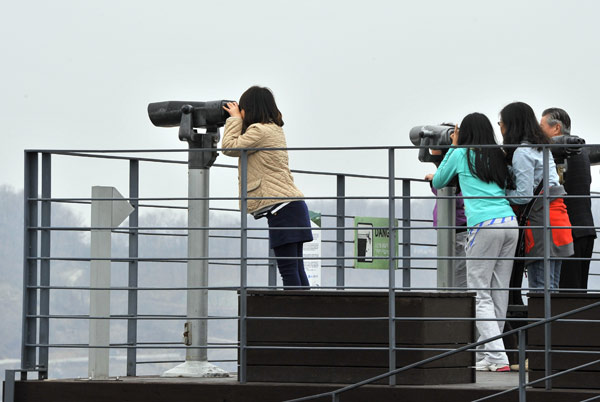Curious tourists head to border despite threats
Updated: 2013-04-11 07:31
(China Daily/Agencies)
|
||||||||
Undeterred by Pyongyang's apocalyptic threats of nuclear war, a daily convoy of tour buses still wends its way to the Demilitarized Zone, which separates the two countries in the Korean Peninsula.
For some foreign visitors, the hot rhetoric has even become a white-knuckle incentive to travel to the heavily fortified border, a major tourist attraction and a vestige of the 1950-53 Korean War.
"It's getting a lot of attention around the world, and it's really exciting to be a part of that and see it firsthand," said Shan Shan-loh, a tourist from Malaysia.
Luis Andrade, an engineer from Venezuela, was equally enthusiastic.
 |
|
Visitors look toward the DPRK at a park near the demilitarized zone between the ROK and the DPRK, in the border city of Paju. Jung Yeon-Je / Agence France-Presse |
"This is the closest I've been to a Cold War situation," Andrade said."I've been to Berlin but long after the wall fell. This is like a live Berlin Wall."
When foreign tourists visit Panmunjom on the border between the Democratic People's Republic of Korea and the Republic of Korea, they are subject to a host of rules on how they must behave, one of which clearly states: "No scoffing".
Ten days ago, Pyongyang declared it had entered a "state of war" with Seoul, and on Tuesday advised foreign tourists to consider leaving the country.
But experts say it is nowhere near developing an advanced nuclear device, and both citizens and foreigners in the ROK have shrugged off the threat.
"The North Koreans are just trying to scare people and make them nervous," said one tour operator, who added that visitor numbers had shown little deviation from seasonal norms.
"Out of an original group of 43, we had two cancel today, but that's rare," the operator said.
"We stay calm and steady. If there was any real safety fear, the UN would cancel the tours. We follow their lead," she said.
A long line stretched out from the entrance to one of the tour highlights - a secret tunnel discovered by the ROK in 1978.
The tunnel is a reminder of a time when peninsula tensions were more about action than rhetoric, and is an impressive feat of engineering, dug at a depth of about 75 meters.
The main draw of the tour is Panmunjom, the border village where the armistice that ended the Korean War was signed and where guards from the two neighbors now eyeball each other at close proximity.
Before touring Panmunjom, tourists must sign a "visitor declaration" which, as well as ruling out scoffing, prohibits pointing and gesturing.
"If any incidents should occur, remain calm," reads the declaration, which also requires the signatory to waive any right to compensation for any "damage of body" resulting from the visit.
Most tourists sign after just a cursory glance.
Guide duties at Panmunjom are mainly performed by a designated UN security escort specialist, one of whom said the heightened tensions had a limited impact on those serving at the border.
"Or on us, at least. If the North did something to the UN, it's like declaring war on the world. The South Korean forces probably feel the tension more," he said.
Agence France-Presse

 Li Na on Time cover, makes influential 100 list
Li Na on Time cover, makes influential 100 list
 FBI releases photos of 2 Boston bombings suspects
FBI releases photos of 2 Boston bombings suspects
 World's wackiest hairstyles
World's wackiest hairstyles
 Sandstorms strike Northwest China
Sandstorms strike Northwest China
 Never-seen photos of Madonna on display
Never-seen photos of Madonna on display
 H7N9 outbreak linked to waterfowl migration
H7N9 outbreak linked to waterfowl migration
 Dozens feared dead in Texas plant blast
Dozens feared dead in Texas plant blast
 Venezuelan court rules out manual votes counting
Venezuelan court rules out manual votes counting
Most Viewed
Editor's Picks

|

|

|

|

|

|
Today's Top News
Boston bombing suspect reported cornered on boat
7.0-magnitude quake hits Sichuan
Cross-talk artist helps to spread the word
'Green' awareness levels drop in Beijing
Palace Museum spruces up
First couple on Time's list of most influential
H7N9 flu transmission studied
Trading channels 'need to broaden'
US Weekly

|

|







